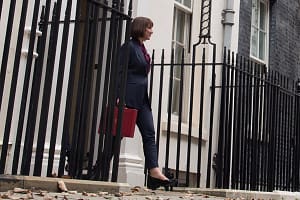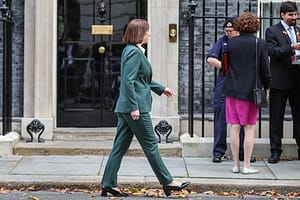Public approval of Keir Starmer’s leadership has jumped by ten points in the last fortnight, according to Opinium’s latest polling.
As global leaders meet to discuss ending the war in Ukraine, Starmer’s surge in approval rating coincide with improving views on a number of metrics compared to a month ago, most notably on his ability to stand up for Britain abroad (net agreement up 15 points from -23% to -9%), his leadership strength (net agreement up 13 points from -30% to -17%), his bravery (net agreement up 12 points from -28% to -16%) and decisiveness (net agreement up 12 points from -20% to -8%) . Starmer sees a net positive approval (net +20%) for his handling of the situation in Ukraine.
Whilst still negative, Starmer sees an improved net approval rating of –23%, up from the previous figure of –33%. On the other hand, Kemi Badenoch and Ed Davey have seen small rises in their approval ratings, while Nigel Farage’s remains unchanged.
This comes as three in five (60%) believe the UK should increase defence spending. Labour now leads the Conservatives on public opinion on being the best at handling all six defence and foreign policy issues Opinium measure, with a 12 point lead on working with allies against threat to the UK (up from a 1 point lead at the end of January), and a 7 point led on allocating funding to defence (up from -2).
Budget cuts to fund defence spending
With a majority supporting an increase in defence spending, all eyes will be on Rachel Reeves on 26th March for the Spring Statement.
The proportion who feel that spending for defence should increase has remained steady, with the public preferring this to be done by cutting other public spending (44%). This contrasts with less than one-in-five (17%) who feel it should be funded by an increase in tax. Notably, more 2024 Labour voters would prefer defence rises to come from spending cuts as opposed to tax rises (39% vs 26%), an increase from the even split a fortnight ago.
Two-thirds (66%) of those who believe spending cuts should fund defence spending increases, think this should come from international aid, with 86% of Reform voters, 77% of Tories voters, and 59% of Labour voters thinking this.
Additionally, a third (32%) of people who think there should be cuts to fund defence, think the cuts should come from welfare and benefits – among this group, seven in 10 (72%) believe unemployment benefits specifically should be reduced.
Negotiations around Ukraine
As Trump’s negotiations begin to favour Putin over Zelenskyy, the British public see the UK and US as divided on negotiations for peace between Ukraine and Russia (net -8%). Alternatively, Europe overall is considered united on the issue, with the UK and Ukraine having the strongest solidarity (+61%).
When asked which European leader they think has been leading negotiations on behalf of Europe to end the conflict in Ukraine, Keir Starmer is considered to be taking the main leading role (21%) by the British public. He is then followed by French president Emmanuel Macron (12%), and European Commissioner Ursula von der Leyen (9%).
Priya Minhas, Associate Director in the Political and Social team at Opinium said, “The rapidly evolving Ukraine and Russia conflict appears to be a turning point for Keir Starmer’s public image. For much of his tenure as Prime Minister, Starmer has grappled with negative approval ratings.
“However, in the past fortnight, his handling of the crisis has started to shift perceptions. He’s now seen as more decisive, brave and more capable of standing up for Britain on the world stage. His leadership is resonating more with the public, and these early signs suggest that his adept handling of international affairs could be the key to reshaping public opinion in his favour”






Leave a Comment